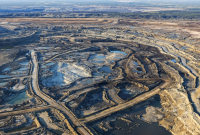Support strong Canadian climate journalism for 2025
When Canadians head to the polls on October 19th, they will choose both our next federal government, and whether they want a good COP or a bad COP.
The Conference of the Parties (COP) is the top decision-making body on international climate change negotiations that meets this November - December in Paris. COP-21's goal is to hammer out an international agreement to address climate change by limiting global greenhouse gas emissions.
A successful transition from our current carbon-intensive economic growth model to a low-carbon world is essential to sustain global economic prosperity, according to the World Bank, the IMF, and other economic experts.
This means that there is a lot at stake at the COP for all countries, and if Stephen Harper and the Conservative party form the next government, Canadians are going to see a bad COP. A bad COP would be ugly, with serious negative impacts on all of us and the rest of the world, including rising sea levels, increased incidence of extreme weather and wildfires, and more global instability driven by rising disruption of food and water supplies.
All of these factors will also increase financial market volatility, affecting our savings and investments.
Yet the importance of managing a smooth economic transition to a lower-carbon, climate-secure economic system has been lost on Stephen Harper’s administration, who continue to deny the need for action on climate change, and whose Cabinet ministers and diplomatic appointees moonlight as oil industry lobbyists.
As a result of this approach, Canada sits at the bottom of global rankings on climate action, and is no longer an active participant in the negotiations leading up to an agreement in Paris. If Stephen Harper chooses the negotiation team sent to Paris in December, Canadians will see a bad COP, with negotiators whose brief is to be obstructionist, nasty and seeking to sabotage a global agreement that is in everyone’s best interests.
A bad COP under Conservative leadership would lead Canada down the path to a disorderly transition, ensuring painfully high levels of stranded fossil fuel assets in the future, as export markets for Canadian fossil fuels dry up. Financial dislocation will afflict the national economy, including the potential for contagion through our interlinked financial system and our pension savings.
In contrast to bad COP, a good COP negotiating team would realize that it is necessary to quantify the risks implicit in business-as-usual investment in Canadian fossil fuels; the good COP team would analyse how an international climate agreement will impact on Canada’s energy sector.
This would help investors, including Canadian pension funds, to identify and wind-down investments that do not clearly fit within the post-COP national carbon budget. With the right signals from good COP, Canadian pension savers and other financial market players will have time to respond to the financial implications of a global two-degree carbon emissions budget.
What does good COP look like?
If Canadians choose a new government in October, we may get to meet good COP. Good COP’s Canadian policy team could do three things to support the transition to a low carbon economy:
1. Support an international agreement – legally binding if possible – to limit global emissions and promote transition to a carbon neutral global economy as soon as feasible. By actively supporting the negotiation process, Canada can deliver better climate outcomes at home and internationally.
2. Apply best-in-class regulations across the Canadian economy that can drive the use of zero or near-zero emission technologies in the construction, transportation and power sectors, applied to all new installations and retrofits.
3. Develop and implement a plan to scale back costly taxpayer subsidies to fossil fuel companies while strengthening support for renewables and innovative energy technologies. The OECD Inventory of Support Measures for Fossil Fuels 2015 indicates that Canadians spend billions of dollars on handouts to fossil fuels companies which directly undermine global efforts to curb emissions and combat climate change, as well as interfering with market signals to investors on high-risk, high-carbon projects.
In addition to negotiating on the three points above, a good COP could take heart from analysis on the benefits of transitioning to low carbon. According to Chris Bataille, co-author of a recent report on pivoting the Canadian economy towards carbon neutrality, “de-carbonizing heavy industry and primary extraction is a once-in-a-century opportunity to use our strong science, engineering and manufacturing base, even our low dollar, to create exportable products that can be used worldwide.”
Financial markets must align with 2° carbon budgets and good COP outcomes
Canadian financial markets, including financial regulators like the Bank of Canada, the Ontario Securities Commission, and the Office of the Superintendent of Financial Institutions (OSFI) need to translate the results of a global climate plan into language and regulations that are relevant and useful for investors. Just as Carbon Tracker, a financial NGO, has translated the meaning of carbon budgets for the world’s financiers, Canadian market regulators need to get serious about describing what the transition to a low carbon economy will mean for investment and capital allocation across Canadian industry.
Alongside clear signals from market regulators, Canadian energy companies will need to have blueprints in place that outline an orderly transition to the climate-secure global energy system that will emerge with the help of a good COP. These blueprints will come from corporate leaders, and from shareholders who realize that Canada’s energy future will be a low-carbon one.






Comments